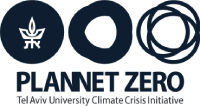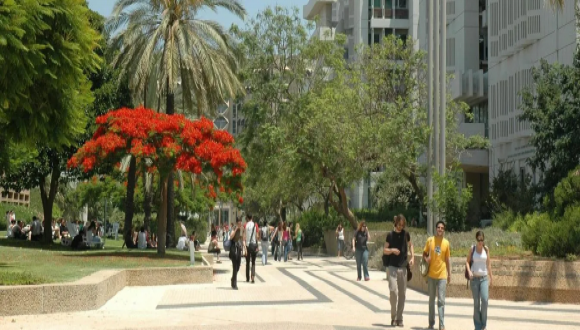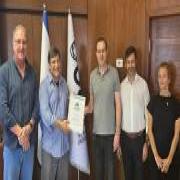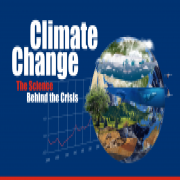Tel Aviv University's Green Energy Transformation
Within two years, all the electricity used by the TAU campus will be green energy based
For the first time in Israeli academia, the Green Council of Tel Aviv University presents an external, comprehensive and objective report that examines and evaluates all indirect and direct greenhouse gas emissions on campus. The news: The independent production of solar electricity produced on campus will be significantly expanded, and an applied plan to reduce greenhouse gas emissions on campus will be formulated and implemented.
Greenhouse gas emissions of approximately 70,000 tons of carbon dioxide per year
in 2021, the University's Green Council, led by President Prof. Ariel Porat and CEO Gadi Frank, decided to appoint a team of experts and academic and administrative expertise towork to build a strategic plan with the aim of significantly reducing greenhouse gas emissions on campus by encouraging efficiency in the use of resources and investment in renewable energy.
The team hired EcoTraders to conduct a baseline assessment of the carbon footprint (in terms of CO2 eqv carbon equivalent), derived from its range of activities both on and off campus. The team of expertise and experts includes the head of the expert team - Prof. Marcelo Sternberg from the George S. Wise Faculty of Life Sciences, Dr. Vered Blass and Dr. Orly Ronen from the Porter School of the Environment and Earth Studies, Prof. Avi Kribus of the Ivy and Eldar Fleischman Faculty of Engineering, Mr. Ofer Lugassi, VP Engineering and Maintenance, and Alon Sapan, Director of the Steinhardt Museum of Natural History.
The comprehensive report includes all facilities on campus that are operationally owned by the university, including the Broshim and Einstein student dormitories. In addition, the carbon footprint of the university's suppliers was assessed, from electricity consumption on campus, through transportation, construction inputs to food served at conferences.
Data from the report, which relates to 2019 (before the outbreak of the COVID-19 pandemic, which disrupted many activities and temporarily reduced emissions), show that in that year Tel Aviv University was responsible for greenhouse gas emissions of approximately 70,000 tons of carbon dioxide. The vast majority (93%) was due to indirect emissions, with only 7% of them due to direct emissions on campus, mainly from air conditioning systems.
In first place in our greenhouse gas emissions is electricity consumption at 42%, followed by the production and production and management of waste on campus at 11% and the total transportation activity of the university, i.e. the mobility of about 40,000 students and faculty to and from campus on a daily basis, as well as flights by faculty and students abroad, which is responsible for 12% of all emissions (about a third of which derives from flights).
The other causes of greenhouse gas emissions are services and food, such as cafeterias, which account for 7% of emissions, construction inputs with 4%, fuel and energy in university facilities which account for 4%, procurement 4%, and computer and laboratory equipment for 3% of emissions. Other categories account for 6% of total emissions.
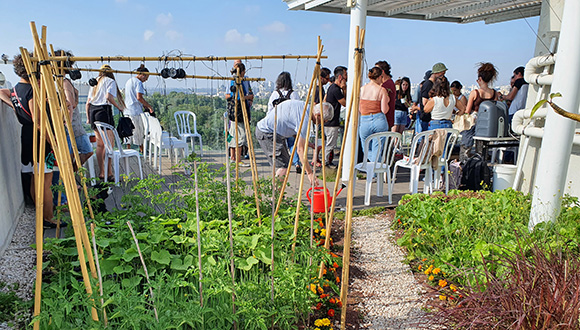
The Porter building Green Roof at Tel Aviv University
A carbon neutrality work plan
Now, with the publication of the report's findings, the team of experts and experts is working on building an applied plan to reduce greenhouse gas emissions on campus, which will be presented for comment and discussion at the Green Council and then submitted to the university administration for approval. Tel Aviv University emphasizes that it sees importance in the use of sustainable energy, recycling water and materials, reducing paper use, reducing emissions caused by transportation and flight activities, and carrying out greener procurement, along with other actions to reduce the carbon footprint on campus and reach carbon neutrality in the future.
"Tel Aviv University has decided to contribute its modest part in reducing greenhouse gas emissions, which is a necessary condition for preventing the climate crisis," says Prof. Ariel Porat, President of Tel Aviv University and Chairman of the University's Green Council, adding: "We intend to formulate an orderly and detailed work plan for the next ten years, in order to reach carbon neutrality down the road. Our hope is that we will serve as an example for other institutions in Israel and around the world to take similar actions, and even contribute to educating future generations on this important issue."
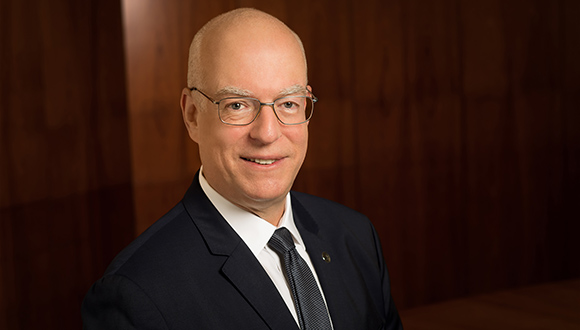
Prof. Ariel Porat, President of Tel Aviv University
Gadi Frank, the university's CEO, reinforced the president's remarks, saying, "We are working to ensure that within two years all the electricity used by the campus will be produced from green energy. Today, there are more than 5,000 meters of photovoltaic cells on campus, and our goal is to triple the amount on campus rooftops. In addition, we will install storage facilities that will greatly increase the utilization of these solar energy cells. We will buy the rest of the electricity from private producers, who specialize in producing energy from renewable sources only."
"The report clearly shows that electricity consumption is the most polluting factor on campus. In the past, we could not influence emissions resulting from electricity consumption, because the mode of production is determined by the Israel Electric Corporation. But now, with the opening of the energy market, we intend to look at moving from electricity suppliers that burn natural gas to suppliers that rely on renewable energy, and expand the self-production of solar electricity produced within the campus. As for food orders, We intend to examine a variety of actions, from reducing the amount of food by limiting the permissible financial cost per capita, to preventing meat products from being ordered for events and buffets," explains the team of experts and experts.
"It is not trivial that the university invests resources in collecting and analyzing the data, and even less trivial that it publishes this data. But we are serious about our strategic vision to strive for carbon neutrality in the future."
A good place in relation to the pollution of other universities in the world
The team of experts emphasizes that compared to data from an article published in 2021, which included 21 leading universities in the world that conducted a similar process, Tel Aviv University is ranked 9th for emissions per built square meter and 12th for emissions per capita. The university is responsible for greenhouse gas emissions of 1.56 tonnes of carbon dioxide equivalents per capita per year, compared to 8.2 tonnes of carbon dioxide equivalents per capita per year by Yale University, 2.7 tons by the University of Melbourne and 0.73 tonnes by fashion university in Lüneburg, Germany.
"About a year ago, we set out and decided that in order to lead real change on campus, we must conduct a thorough and comprehensive mapping of all greenhouse gas emissions at the university. This is a complex process that required the mobilization of many elements on campus, who for the first time agreed to expose us and the authors of the report to data that until now have not been public. This is the first time that a university in Israel has made such a move, and we are sure that now other universities will follow in our footsteps," the members of the expert team said excitedly. "The new report lays the groundwork that allows us to take a holistic look at the university's total greenhouse gas emissions and, based on the findings, identify the most polluting activities. In this way, we can build comprehensive work plans to reduce emissions from these activities in the short, medium and long term. In addition, the report will enable monitoring and testing of the reduction in emissions over time compared to the initial values. It is not trivial that the university invests resources in collecting and analyzing the data, and even less trivial that it publishes this data. But we are serious about our strategic vision to achieve carbon neutrality in the future," the team concludes.
Read the full report (Hebrew)
